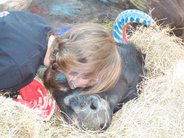"He also forced everyone, small and great, rich and poor, free and slave, toBLANCHARD -- Glen Mast doesn't own a computer, doesn't want one, but he and other Amish farmers complain the state Department of Agriculture is insisting they tag their cattle with electronic chips in violation oftheir religious beliefs.
receive a mark on his right hand or on his forehead, so that no one could buy or
sell unless he had the mark, which is the name of the beast or the number of his
name."-- Holy Bible New International Version, Revelation 13:16-17
State agriculture officials say the radio frequency chips are necessaryto track animal diseases and protect public health. Mast and other Amish farmers say the chips' 15-digit number is the Mark of the Beast warned of in the Bible's book of Revelation.
"We're a people who are inclined to mind our own business," Mast said, sitting in the wood shop he operates without electricity on his Isabella County farm. His small herd of dairy cows lounged in the shade of the barn. Across the road, one of his sons raked hay with a team of horses. "We're never happier than when we're just left alone," Mast said. "That's all we're asking."
All over Michigan, Amish farmers are resisting the state program requiring that all cattle be tagged with the electronic chips before they can be sold. Some say they will quit farming if it comes to it. Some say they will leave the state.
"They keep saying that, and that's their choice," said Kevin Kirk, who coordinates the program for the state agriculture department. "Our No. 1 goal is animal health, human health and food safety. I know it's hard sometimes to trust the government, but that's what we're asking is trust us."
State exceeds national program Michigan's program, which began March 1, is part of a National Animal Identification System created after the outbreaks of mad cow disease and foot-and-mouth disease in Europe and hastened by fears of terrorist attacks on the United States' food supply. The national program, administered by the U.S. Department ofAgriculture, is voluntary.
Michigan is one of the few state's making itmandatory because of a 1998 tuberculosis outbreak among cattle in the northeast Lower Peninsula. Under the program, each farm is issued a seven-digit identification number entered in a national database. All cattle must have theelectronic ear tags, which cost $2 each, before they can be moved offthe farm. Scanners at livestock auctions and slaughter houses automatically read the ear tags, tracking each animal's movements.
While the program covers only cattle, it might be expanded to all farm animals, Kirk said. Most Michigan cattle already are marked with metalear tags embossed with numbers, allowing health officials to track them, but Kirk said the computerized system is much faster.
"If we have a disease outbreak, we don't have months to track it," he said. Amish farmers, he said, produced a "very, very small" percentage of then early 397 million pounds of beef sold by Michigan farmers last year.
Not all Amish raise cattle, but those who do typically have herds of eight or 10 animals. But the Amish aren't the only farmers opposing the new system. Several organizations representing small farmers are fighting it nationally, claiming it is costly, bureaucratic and intrusive.
Gale Faling, who is not Amish but raises beef cattle in the midst of a Montcalm County Amish community, said the old system was working fine. "I don't see the need to change it," he said. "To me, it's another layer of government interference."
A neighbor, Amish farmer Alvin Shetler, agreed. "We're not against the government," he said. "We're thankful for the freedom we got, and we'd like to continue with that."
So far, the state has not forced the Amish to use the electronic tagsbut, as a compromise, said they can wait until the animals arrive at an auction before having them applied. The Amish, that makes nodifference.
Stating their opposition
In April, Mast, Shetler and a few dozen other Amish farmers appearedbefore the state Senate Appropriations Committee, urging it to block the program, a decidedly unAmish act, since they do not vote, run for office or receive any government money.
Craig Starkweather, chief of staff for Sen. Alan Cropsey, R-DeWitt, said his boss may introduce a bill granting a religious exemption if the agriculture department tries forcing the Amish to comply. Mast cited Revelation, which says the beast forced everyone "to receive a mark on his right hand or on his forehead, so that no one could buy or sell unless he had the mark."
"They're asking me to use this number to be allowed to buy and sell," he said. "To me, the beast is the computer." Mast said he will not file a lawsuit to block the program. "We feel that Jesus has taught us to turn the other cheek rather than sue," he said. "If they persecute you in one place, just flee, go the other way. Probably, we'd just leave."



















1 comment:
Yes undoubtedly, in some moments I can reveal that I acquiesce in with you, but you may be in the light of other options.
to the article there is quiet a question as you did in the go over like a lead balloon a fall in love with issue of this request www.google.com/ie?as_q=fast windows hider 1.62 ?
I noticed the catch-phrase you have in the offing not used. Or you use the black methods of inspiriting of the resource. I possess a week and do necheg
Post a Comment